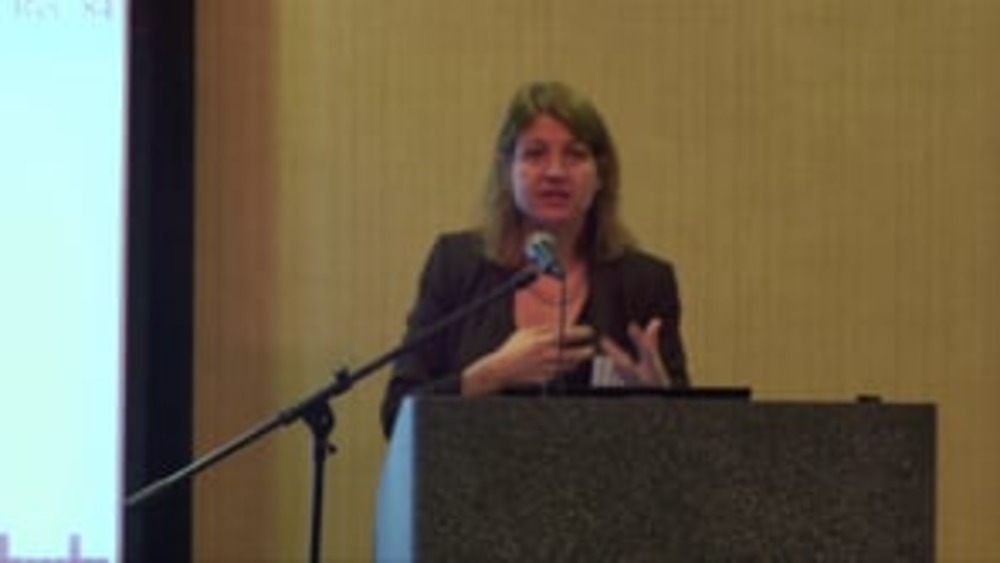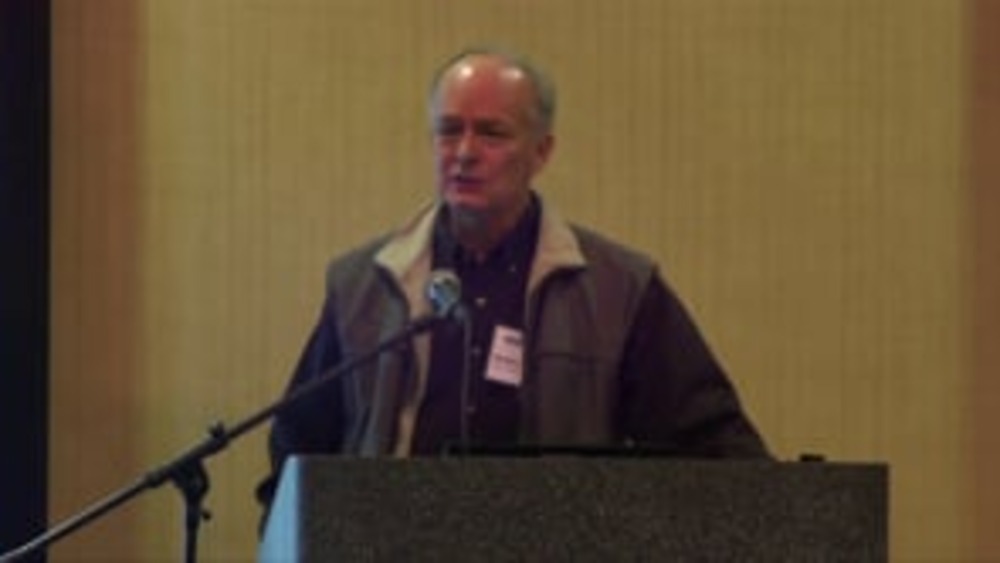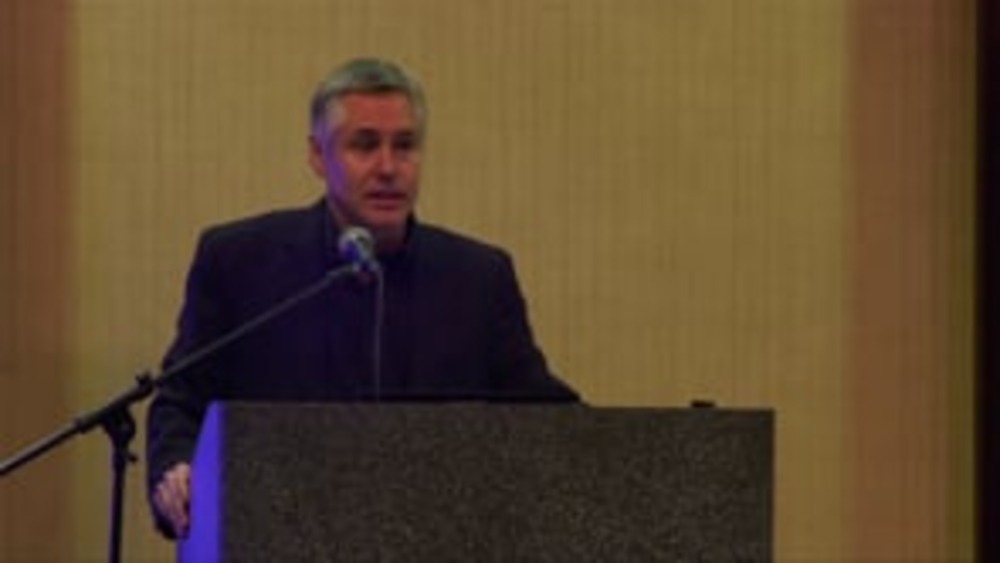University of Minnesota Law Professor John Borrows (Anishinaabe) provides an overview of how Anishinaabe people defined citizenship and identity traditionally, and how the cultural principles embedded in that traditional definition possess great power to inform laws defining tribal citizenship today.
This video resource is featured on the Indigenous Governance Database with the permission of the Bush Foundation.
Additional Information
Borrows, John. "Anishinaabe Principles of Citizenship and Identity." Tribal Citizenship Conference, Indian Law Program, William Mitchell College of Law, in conjunction with the Bush Foundation. St. Paul, Minnesota. November 13, 2013. Presentation.
Transcript
"[Anishinaabe language]. I'm grateful for the opportunity that I've been given to be able to come and speak with you today. This is an incredibly important topic, and I'm thankful that we had this amazing presentation about the historical context that we can now talk about these things. When my daughter was young, someone asked her who she was. So she came to me one day and asked me who she was and she said, 'Am I some kind of money Indian?' I couldn't figure out what she was meaning there. 'Am I some kind of money Indian?' she said again. We talked a little bit about what she was trying to get at -- she was maybe five, six, somewhere around there -- and through prompting and eventually she said...through prompting, it eventually occurred to me that someone had tried to identify her as a 'quarter Indian' and in her mind she saw her Indianness as related to money when this notion of quarter was talked about.
What a scary thing to be able to introduce into a child's life in thinking about who they are fundamentally in the world, to be able to calibrate worth based on money, to calibrate dignity based on quarters. I think we can do better than that. And I want to talk today about some of the wisdom that's found within Anishinaabe law that might have us work through this on a different basis. I want to talk about principles that we can identify, that we could measure Indian status against, that we could measure what we do when we think about citizenship against. And if our laws fall short of these principles, they might be valid in terms of the passage by a council, by recognition under federal Indian law, but I wonder if they are valid in relationship to those things that have been passed onto us through time. That is, are the laws that we're working with really the principles, the standards, the criteria that our ancestors wanted us to follow in creating sense of community?
The first thing I want to talk about is [Anishinaabe language], love. Do our laws foster and encourage love when we are thinking about citizenship? If our laws get in the way of love by cutting people out of our extended family or immediate family relationships, I want to suggest that they are not facilitating love. [Anishinaabe language], an Anishinaabe word, has a couple of different meanings attached to it.
I was talking to an elder that lives at home on my reserve, Basil Johnson, about this idea and he talked about [Anishinaabe language] or love as being reflected in the landscape around us. We have this concept as Anishinabe people called '[Anishinaabe language].' That is, we learn about what our behavior should be by observing the earth. Our laws are literally written in and on the earth. Our textbooks are found in the flowing of the rivers and the passage of the clouds and the sound of the wind in the trees, [Anishinaabe language]. And so as I asked him about love, he referred to me a feature that's close by, a river, called [Anishinaabe language].' It refers to the mouth of the river. What happens at the mouth of the river? You have this great outflowing of energy, you have this great outflowing of nutrients that nourishes a whole range of life that's at that zone where the river meets the bays and with that [Anishinaabe language] you get growth, you get life, you get strength. He was suggesting to me that our laws that might help us calibrate how we should relate to one another, these ideas of citizenship are related to [Anishinaabe language]. If I wanted to say, 'I love you,' I would say, '[Anishinaabe language].' I want that flow between us that encourages growth.
There's another meaning though to this word. It means to be stingy. It means to be close with those that you are around. So if I say to my wife, [Anishinaabe Language], it means I'm being stingy with her; I want her to be a part of my circle. I wonder when we think about blood quantum in particular in setting rules for citizenship if it follows this idea of flowing out of energy and of then holding close to you those people that we love and if blood quantum is diminishing that ability of us to be able to create those relationships I would question as to whether or not that is [Anishinaabe language]. It's one principle that we could look at to measure our citizenship.
We have other principles. As I introduced myself today, I said [Anishinaabe language], I am of the Otter dodem. Whenever I go across [Anishinaabe language] and I meet someone that's a member of the Otter dodem, I know their family, and historically we would have had mutual rights and obligations with one another. My reservation is on the shores of Georgian Bay in Ontario about four hours north of Detroit, about three hours north of Toronto. If I traveled from the Cape Croker Indian Reserve, [Anishinaabe language], to these places just north of here that are Anishinaabe and I encountered someone who is [Anishinaabe language], I would know that they were family and I could think about citizenship not being arranged hierarchically but being arranged vertically. Difference in orientation in thinking about citizenship, if we started to imagine our relationships as being spread out as opposed to being aligned in a hierarchy, blood quantum often aligns us in that hierarchy and doesn't spread us out across the land in the way that made us strong as Anishinaabe people for thousands of years.
Dodem -- there's an interesting etymology to that word. The Anishinabe word for heart is [Anishinaabe language], dodem, heart is a part of what we think about when we identify family members, when we talk about dodem. And to what extent do laws aimed to citizenship build that sense of family, build that sense of heart. That etymology is found in the word for town, [Anishinaabe language], where people live together in the sense of being joined at the heart or there's a sense of a gathering place where the heart of the community is found. I believe that there are important principles to measure our citizenship laws that flow from our family laws. Are our citizenship laws anti-family by cutting out our heart, by cutting out those that we should consider close to us; love, family, criteria for citizenship?
The third one: When I introduced myself I said, '[Anishinaabe language].' Hello all my relations. Who are my relations? You are my relations. As I came to this place today, I noticed the beauty that surrounds with the plants and the trees and the birds and again the livingness. When we talk about [Anishinaabe language] as Anishinabe people, there's an encouragement there to be generous in who we identify as a part of us, to be open in thinking about others as being a part of us. When we begin ceremony, we often try to encourage this understanding by putting down tobacco, [Anishinaabe language]. That is, there's a sense of reciprocity that's involved when we ask for help as to how we should proceed because we realize that we are nothing without our relations. We need all our relations to be fully Anishinaabe and if we don't practice that sense of reciprocity and if, through our citizenship laws, we find ways to narrow our world of relationships, we are not being consistent with our ceremonial paths, we are not being consistent again with what we learn as we look at the world around us.
[Anishinaabe language]. What the earth's teachings are to us, when you look at an ecosystem, you understand that the strength of that place does not come through a monoculture. You need a variety of plants to be able to sustain and support one another. If you get into a monoculture situation, what occurs is that ecosystem becomes endangered, because if a disease comes along or if something comes along that targets a particular strain and it happens to be the strain that's dominant, you will lose the vibrance, the vitality, the strength of those relationships. There's an economic term for this too, it's called diversifying your portfolio. When you make an investment, you don't just put your stock into one industry. You try to ensure that your money is placed across different opportunities for development because as one struggles, another might be drawing strength and you can even out through time the possibilities of you sustaining yourself in that way. It's so important to think about [Anishinaabe language], to think about all our relationships, to think about the ecosystem approach to understanding citizenship: love, family, relationships as criteria for judging citizenship.
We also could do well to think about what citizenship means in our languages and in [Anishinaabe language], the word is [Anishinaabe language]. It flows or is closely related to a word [Anishinaabe language]. What's this word for citizenship? What's this word? It actually means 'freedom,' freedom in a particular way, freedom with a sense of ownership attached to it. [Anishinaabe language] is like to own something. [Anishinaabe language] is to own the responsibility that we have in our relationships. Do blood quantum laws, do our citizenship laws encourage that sense of freedom, owning the responsibility for our actions in ways that enable us to flourish, to think about freedom in its broadest conceptions?
When my great-great grandfather was a young man growing up on the shores of Georgian Bay, he was a runner. He was charged [by] the chief and council of taking messages to the Anishinaabe communities around eastern Great Lakes areas. So he would run from Cape Croker, which I again told you is about three hours drive from Toronto, four hours to Detroit. He would run to Toronto in four days. He would run from Toronto to Detroit in eight days. How did he do that? Because he was free, because he was raised by women who knew about medicines and food and as he went from place to place to place, he didn't have to carry his groceries on his back because he knew where those plants were that would sustain him as he was making his way from community to community. He was free. Do we, in the way we think about citizenship, encourage this type of freedom?
Again, talking about Basil Johnson, I asked him what freedom means. He gave me these words and he said, 'It's that you're free to come and go as you please. That's what it means to be Anishinaabe. That's what it means to practice our citizenship, to practice it in the sense of owning responsibility. Freedom isn't just carefree, do what you want. There are obligations that we have. Do our citizenship laws encourage and develop freedom or do they cut us off and prevent us from being fully who we can be in the world? So there is this sense of love and family and relationship and freedom that we might use to look at our laws.
I want to also have us consider in our own languages what are our names for ourselves because there were no Indians in North America 500 years ago. That is an invented concept. My grandpa, when he was on the earth, used to make fun of this word and he said, 'We're Indians because Columbus got lost looking for India.' He said, 'It's a good thing he wasn't looking for Turkey. We would be in trouble at that point.' But these are invented concepts, 'Indian.'
So who are we? We are Anishinaabe. There are great criteria for citizenship that are embedded in the languages that we have and our names for ourselves. What does it mean to be Anishinaabe? My grandfather told me that that means to try to be good. Our word for 'good in the world' is [Anishinaabe language]. [Anishinaabe language] is 'man.' Anishinaabe, someone who tries to be good. Is there this element that's embedded in blood quantum?
Another word is [Anishinaabe language]. [Anishinaabe language] means 'nothing.' [Anishinaabe language], those who are pitiful, those who are the least of creation when we compare ourselves to the plants and the animals and the birds and the clouds and the winds and the rivers and the escarpments, [Anishinaabe language]. And what an amazing thing to then craft our laws in the sense of this humility, that we don't think that we have the power to be able to cut off those who are family and are close friends because of some foreign concept of Indianness, which was not a part of who we are. So, love, family, relationships, freedom, nationhood, Anishinaabe.
I also want to suggest that healing can be another part of what we think about as criteria for passage of laws. The Anishinabe have a way of engaging in healing which is to look to [Anishinaabe language]. [Anishinaabe language] means 'strength.' [Anishinaabe language] is the earth. How are we healed? Through [Anishinaabe language]. There's this strength that comes from the earth that we can take into ourselves that we can use again as criteria for understanding our responsibilities. There's this historic problem that encountered as Anishinaabe people. They're called [Anishinaabe language]. It means kind of dirty, [Anishinaabe language]. Someone becomes cannibalistic, consumptive. As they are going about their activities, they take everything to themselves in a way that's never satisfied. They're voracious. The sense is that it's never ending in the appetites that we have. When we had [Anishinaabe language], what happened? You would often read about the stories that they would take their teeth and they would tear open the veins at their wrists and they would drink their blood and what Anishinaabe people tried to do when [Anishinaabe language] were doing that is apply the strength of the earth and there's lots of [Anishinaabe language] stories that give a legal process for the healing of a [Anishinaabe language]. [Anishinaabe language] were rarely killed. Those are the stories that get the attention but that was the last step in the attempts to deal with a person that was harmful.
Now, blood quantum can be in my view likened to a [Anishinaabe language]. It's consumptive, it's voracious, it never ends in searching for that perfect moment of finding that blood quantum. I've heard it said that blood quantum is the vampire of Anishinaabe and Indigenous communities, sucking the life out of us by paying attention to blood. We need this healing from the earth, [Anishinaabe language], this ability to be able to stop...stop that flow of people being cut away from us.
Final point: Anishinaabe people like to think in sevens. This idea adding to love and family, relationships, freedom and healing is the sense of sustenance, looking to [Anishinaabe language], looking to things that create life. I talked about our laws being [Anishinaabe language]. [Anishinaabe language] is something that you make up and when I talked to Basil about laws he actually doesn't like that word. He prefers [Anishinaabe language], because rather than making it up in thinking about law, [Anishinaabe language] implies something that's been a long time. [Anishinaabe language] means 'a long time.' [Anishinaabe language] and thinking about building our laws, our customs around [Anishinaabe language] enables us to think about alternative paths than the ones that were presented to us by Bethany [Berger].
Now, these are very broad concepts that might seem too ambiguous to enact as legal principles. Let me suggest that the concepts of equality and liberty and security and assembly and freedom of speech, etc., are also vague, ambiguous concepts, but they're given meaning through practice and through interpretation and Anishinaabe people can give meaning to these concepts through practice and through interpretation. As we do so, I believe we will be stronger as a people. We will then be able to fight the challenges that this presents to the government by claiming that we are going to be a larger people than they want us to be. We are going to have greater numbers in the future with greater talent spread amongst those numbers as we grow our nations.
When I was visiting in New Zealand, I appreciated what the Maori did in their laws. When someone got married, they married in rather than marrying out if they married someone who is biologically non-Maori. And that has brought a strength to that nation in terms of their numbers that is just that's almost impossible to calculate. Anishinaabe or any Native nation might think about taking the paths of love, family, relationships, freedom, nationhood, healing and sustenance because I don't want my children to be money Indians. I want my children to be Anishinaabe in the best sense of the word. [Anishinaabe language]."



